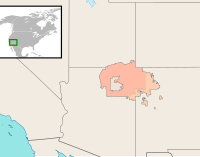Kerr-McGee Corp. v. Navajo Tribe
[2][3] Kerr-McGee held substantial mineral rights in the reservation and filed a lawsuit in the federal district court seeking an injunction to prohibit the tribe from collecting the tax.
Kerr-McGee argued that any tax of non-Indians by a tribe required approval by the Secretary of the Interior and the district court agreed, granting the injunction.
Amicus curiae briefs were filed in support of Kerr-McGee by the Arizona Public Service Co., the Peabody Coal Co., the Phillips Petroleum Co., the Salt River Project Agricultural Improvement and Power District and Texaco, Inc. Amicus curiae briefs were filed in support of the tribe by Association on American Indian Affairs and for the Shoshone Indian Tribe Reservation.
[2] Kerr-McGee argued that the Indian Reorganization Act[4] (IRA) required the Secretary of the Interior to approve any tribal taxes on non-Indians.
[2] Kerr-McGee is one of a series of cases where the Supreme Court has ruled, based on tribal sovereignty, that tribes have the right to tax non-Indians.
[7][8] These cases led to tribes renegotiating inequitable mineral leases, forming their own natural resources regulatory agencies, and tribal development companies.

